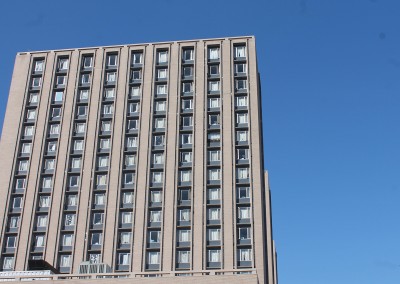
The Boston City Council’s Committee on Government Operations hosted a public hearing Tuesday to discuss two ordinances to revamp the inspection process for off-campus student housing.
The ordinances were created in response to Boston Mayor Martin Walsh’s request for a directory of students from all of the city’s universities as well as new occupancy rules for off-campus housing.
City Councilor Michael Flaherty led the meeting, accompanied by several other councilors, representatives from the Inspectional Services Department and Boston residents.
City Councilor Josh Zakim said the ordinance would be a positive step for student housing in Boston.
“This ordinance is making a real, significant step for making sure we’re systemizing student housing in the City of Boston and … [making] sure that our residents’ quality of life is not negatively impacted by students,” Zakim said. “I think that we are able to make some of these changes, that enforcement is a top priority, that quality of life is safe for everyone.”
According to one of the ordinances, landlords must obtain a special permit that will qualify their property as student housing units. Each permit costs $15, each building has a fee cap of $2,500 and each complex has a fee cap of $5,000.
Soon after the meeting began, ISD Commissioner William Christopher discussed several plans that aimed to help solve student housing issues. Christopher added that the plans included identifying and registering student housing.
“What we want to be able to do is find student housing as a registered use group,” Christopher said. “Universities will be submitting data about where their off-campus students live.”
In order to address occupancy concerns and hazards, Christopher proposed establishing a standard for habitable rooms to be at least 70 square feet. Landlords would be required to report those room sizes in their rental registries.
“We want to put [this requirement] in there because that gives us punitive damage capabilities,” Christopher said. “It makes it mandatory for inspections, which is the thing we’ve had the hardest time with this year.”
Christopher also discussed how the ISD will respond to student housing violations.
“We will go through the filtration that we’ve been going through where we again find wrong properties and again find … violations, whether they are registered or unregistered,” Christopher said. “This will come up in the analysis. Once it reaches a point where we feel that there’s a question, I am going to mail a violation to the owner. The remedy for that violation is an inspection.”
Several Boston residents and students had questions about the ordinances and their consequences.
Joanne Dalcomo, 63, of Brighton, said she disapproved of the ordinance.
“I think the proposed ordinance doesn’t make sense,” she said. “[It] will be meaningless if approved by the City Council.”
Mary Freeman, 53, of Back Bay, said she did not see the necessity for the ordinance.
“It’s not that I have any problem with it,” she said. “I just don’t understand why they need it, I guess, because it doesn’t sound like they’re trying to actually improve student housing, just the inspection process.”
Boston University students had mixed feelings regarding the state of off-campus housing.
Sarah Sherman, a freshman in the College of Arts and Sciences, said she was happy to live on campus and would not move off campus if given the opportunity.
“I don’t feel like I need to,” she said. “I just like my single, and I have a private bathroom.”
Maria Rivero, a junior in Questrom School of Business, said she likes off-campus housing but thinks some residences need to be updated.
“I think [off-campus housing] is safe and there are a lot of options, but some of the buildings need to be remodeled and have air conditioning,” she said.
Kennedy Davis contributed to the reporting of this article.





















































































































